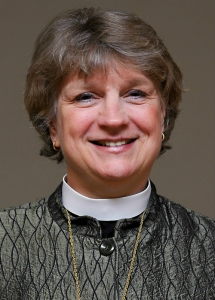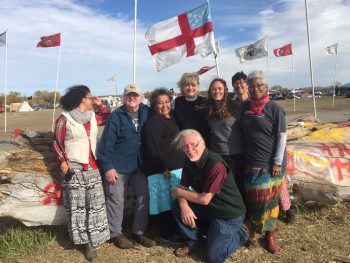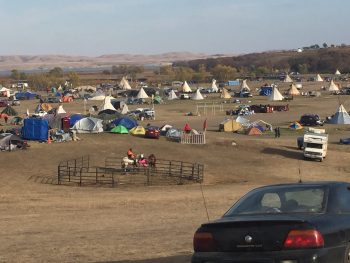 By Bishop Ann Svennungsen
By Bishop Ann Svennungsen
Last week I was privileged to travel to the encampment at Standing Rock Reservation with Pastor Marlene Whiterabbit Helgemo, an ELCA pastor serving All Nations Church in Minneapolis. People from around the world are there, prayerfully hoping to prevent the Dakota Access Pipeline’s (DAPL) construction beneath the Missouri River. It is hard to convey in words the depth and richness of that experience. Still, I will try.
 Let me begin with a caveat: We Lutherans are nothing if not realists about human causes. We are the first to say that there are no perfect persons; we are all simultaneously saint and sinner. Likewise, there is no perfect group of people; there is no perfect movement of people. The gathering at Standing Rock is not without that ambiguity.
Let me begin with a caveat: We Lutherans are nothing if not realists about human causes. We are the first to say that there are no perfect persons; we are all simultaneously saint and sinner. Likewise, there is no perfect group of people; there is no perfect movement of people. The gathering at Standing Rock is not without that ambiguity.
Still, there was something profound and distinctive about what I experienced during my four day visit to Standing Rock.
FROM THE BEGINNING, the elders leading this movement have been clear about the vision that guides them; they are firm in their belief that their only chance of success is to engage the work “peacefully and prayerfully.” Both are required. The encampment begins each sunrise in prayer down by the river, ends in prayer around the camp fire, and continues in prayer throughout the day.
Though tensions have risen recently, my experience while at Standing Rock was that the protests were disciplined and focused in nonviolent action. Oh, nonviolent protest does not mean refraining from misdemeanor activity such as trespassing on the land DAPL needs. Nor does it mean resisting arrest for such activity. These are the actions akin to those of Martin Luther King and Mahatma Gandhi.
There are moments that seem to call to us in hope that
our visible stand will work for good.
The gathering at Standing Rock is also distinctive because it addresses a remarkable convergence of vital concerns: justice for Native Americans, clean water, climate change and a sustainable energy future, the militarization of police.
- Many scholars and theologians argue that there is no greater challenge facing our world than the threat of climate change. The ELCA Social Statement “Caring for Creation” calls us to act
“interdependently and in solidarity with creation,” and in so doing “we do justice. We serve and keep the earth, trusting its bounty can be sufficient for all, and sustainable.” - The ELCA’s commitment to justice for Native Americans is strong, affirmed at the August assembly when we voted “to acknowledge and repent from our church’s complicity in the evils of colonialism in the Americas, which continue to harm tribal governments and individual tribal members.” Standing with the 100 tribes represented at Standing Rock gives ELCA members an opportunity to “acknowledge and repent.”
- The 2013 ELCA social statement on Criminal Justice expresses grave concern about “a movement toward more militarized policing,” noting that “although special circumstances of extraordinary threat sometimes may justify the use of military-like tactics and equipment, those circumstances should not be treated as the norm and run counter to proven community-based methods.”
In my visit to Standing Rock I was overwhelmed by the prayerfulness, humility, discipline, and peacefulness of the people gathered there. No, it’s not perfect. And, real people will be deeply affected economically if the pipeline does not go through. Still, there are moments that seem to call to us in hope that  our visible stand will work for good. These collective actions can inform our own sacrifices for the healing of God’s world – spending time in prayer, using fewer fossil fuels, sharing money to support others, becoming more and more aware of the many moments each day that God might be calling us to work for good.
our visible stand will work for good. These collective actions can inform our own sacrifices for the healing of God’s world – spending time in prayer, using fewer fossil fuels, sharing money to support others, becoming more and more aware of the many moments each day that God might be calling us to work for good.
Luther spoke with a clear voice about our call to love the neighbor. We also believe that seeking justice is what love means in the public square. At Standing Rock, we vividly sensed this call – to love threatened Native communities, to love future generations, to love all creatures. May this be a moment when we humbly engage in self-examination, repentance, and new resolve to use our lives, our power, our resources not for selfish gain or against the rights of others, but in service to the neighbor.

